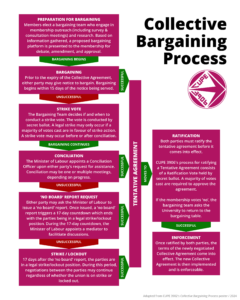Who is CUPE Local 3906?
CUPE Local 3906 is the union that has represented academic workers at McMaster University since 1979, and continues to do so. We are divided into three units: Unit 1 (TAs/RAs in lieu), Unit 2 (Sessional Faculty and Hourly Rated Sessional Music Faculty) and Unit 3 (Post-Doctoral Fellows).
One of the main things that we do is negotiate and enforce a collective agreement for each of our three units. A collective agreement is a legally binding employment contract that outlines all of the benefits, rights, and responsibilities of union members, as well as the responsibilities and obligations of the Employer (McMaster University).
On a day-to-day basis, we serve as the eyes, ears and voice for our members who have concerns about the employment at McMaster.
All three units are currently engaged in collective bargaining with the Employer (McMaster University).
What is collective bargaining?
Collective bargaining is a process in which a trade union and an employer negotiate a first collective agreement or the renewal of a previous collective agreement. The parties usually focus on such issues as wages, job security, working conditions, grievance procedures and benefits. In an university, academic issues- such as academic freedom – are in important bargaining issue.
What is a collective agreement?
A collective agreement is a written contract of employment covering a group of employees who are represented by a trade union. This agreement contains provisions governing the terms and conditions of employment. It also contains the rights, privileges and duties of the employer (McMaster), the trade union (CUPE 3906) and the employees (TAs/RAs in lieu and Post-Doctoral Fellows).
What is the role of an ordinary member in the collective bargaining process?
The most important thing a member can do during bargaining is to stay informed of what is happening. Your bargaining team produces regular updates and holds information sessions, watching for these in your workplace helps keep you in the know. In early 2016, members also completed the bargaining survey to ensure that they had an impact on the bargaining agenda.
Beyond staying informed, members can be involved in many ways. You could volunteer to be a member of the bargaining support team (contact staff@cupe3906.org). A member could volunteer to organize members in their workplace through lunch time meetings and actions in the workplace.
What happens if, during negotiations, the employer and the union cannot agree on the terms of a collective agreement?
Either the employer or the union may ask the Ontario Minister of Labour to appoint a conciliation officer. This officer will then try to help them reach an agreement.
What is conciliation?
Conciliation is a process by which a trade union or an employer can ask the Ontario Ministry of Labour for help in resolving their differences so that they can reach a collective agreement. Either party may apply to the ministry. If parties are in negotiations, they must use, the government’s conciliation services before they can get into a position to engage in a strike or lock-out
Strike Vote FAQ:
What is strike vote? Why do unions hold a strike vote? What does it mean to vote “yes”? Click here for our Strike Vote FAQ
Sources:
Professional Institute of the Public Service of Canada
Ontario Ministry of Labour

